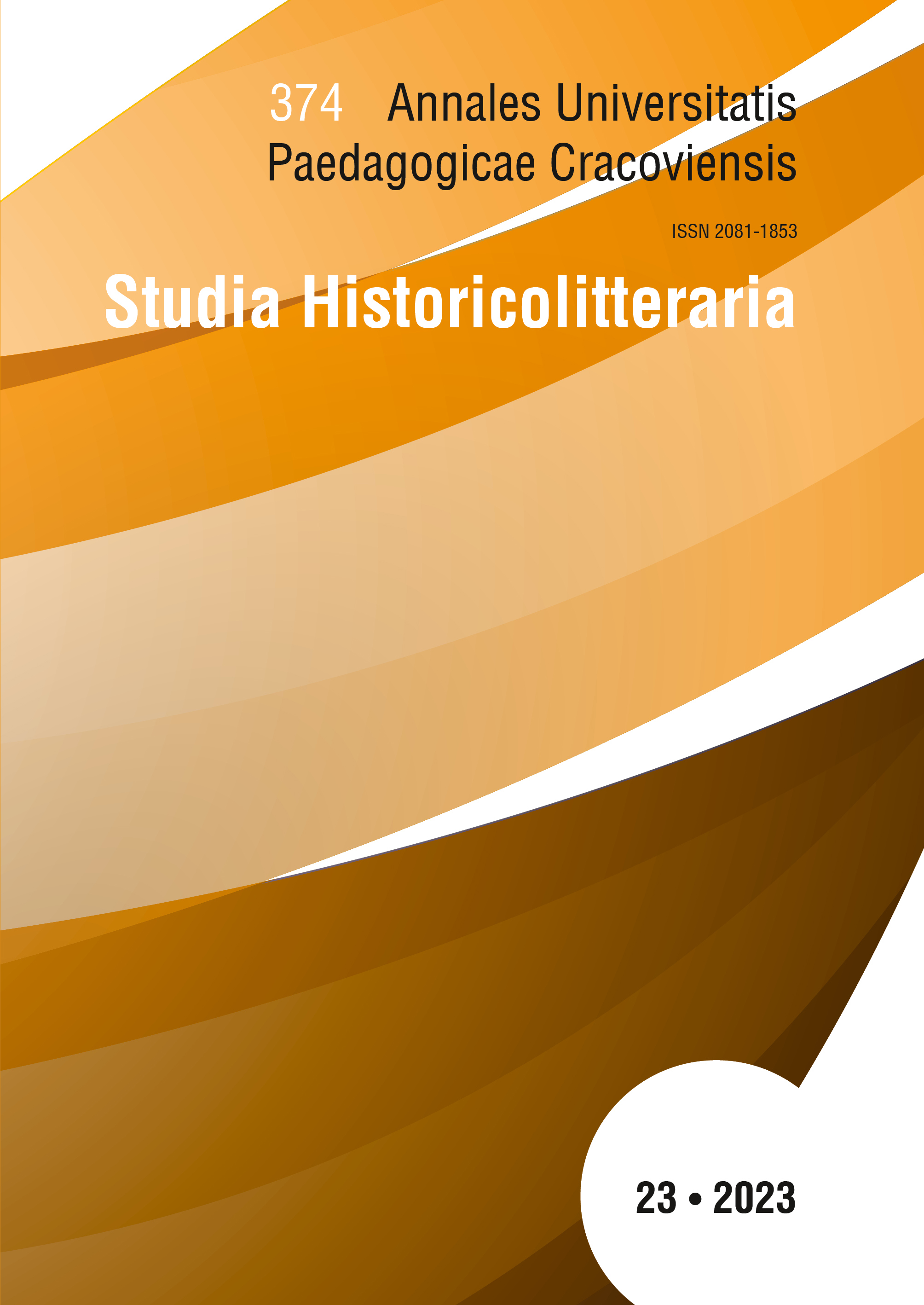'Córa Sienkiewicza' (Sienkiewicz’s daughter). „Złota wolność" by Zofia Kossak. History and modern time
Main Article Content
Abstract
A historical novel Złota wolność by Zofia Kossak‑Szczucka, connects the beginning ofthe 17th century with modern times. It was written right after the May Coup and became an argument in political‑ideological polemics. However, it did not lose the character of a proper historical novel, but when it is read against the background of the journalism of those days, it acquires
the characteristics of a great comparison of the two eras. The author of the article conducted a comparative analysis of a novel and journalism of a conservative journal „Czas”, in which Zofia Kossak published her novel. Historical politics practiced in the journal by distinguished journalists, references to historical School of Krakow and its generalizations, make it possible to recreate the ideological concept of a novel: respect for the rule of “the strong hand”, opposition to anarchy and the spirit of “rebellion”, reluctance towards “sejmocracy” and “party favouritism”. The author emphasizes the role of great leaders: Stanisław Zółkiewski and Karol Chodkiewicz, as well as an “ideologist” of changes, a Jesuit Piotr Skarga. The choice of this person enhances the meaning of Catholic axiology. As for the two hetmans, one can notice allusive references to Józef Piłsudski. A separate part in the novel is dedicated to the history of the Arian movement, shown at the moment of its disintegration and internal quarrels. Zofia Kossak presents the history of the Arians as an analogy to party fights in the 1920s. The main characters of the novel, i.e. “Christians”– the Pielszów Brothers – are located in the middle of the most important historical events of the era: in the Zebrzydowski’s rebellion and wars – the Livonian War and the Moscow War – under the leadership of both hetmans. Kossak’s novel can be interpreted in a broad context as a historically motivated warning against the disintegration of an independent country, involved in political fights between parties. According to the author, in order to rescue both the past and the present, authority should be strengthened and social reforms ought to be introduced. The shape of rules can be determined by a strong and authoritarian individual, but supported by national, religiously motivated unity.
Downloads
Article Details

This work is licensed under a Creative Commons Attribution-NonCommercial-NoDerivatives 4.0 International License.
COPYRIGHT POLICY
The publisher of "Annales Universitatis Paedagogicae Cracoviensis.Studia Historicolitteraria" is authorised to use and distribute all the materials published in the journal on the basis of a non-exclusive licence agreement unlimited in time – previously concluded for an indefinite period of time each time with the author of a specific paper in the fields of exploitation specified in the agreement.
OPEN ACCESS POLICY
"Annales Universitatis Paedagogicae Cracoviensis.Studia Historicolitteraria” is an open access journal, and all its contents are available for free to users and/or their institutions on the basis of non-exclusive licenses under Creative Commons (CC BY CC-BY-4.0). Users can read, download, make copies, distribute, print, search, or to link to full text articles in this journal without the prior permission of the publisher or the author.This is consistent with the definition of open access BOAI (http://www.soros.org/openaccess).
References
Birkenmajer J., Przedśpiew „Dumy o hetmanie”, „Wiadomości Literackie” 1930, nr 8, s. 3.
Brückner A., Różnowiercy polscy. Szkice obyczajowe i literackie, Warszawa 1905.
„Czas” 1926–1928.
Cat‑Mackiewicz S., Sienkiewiczowska córa. Sylwetka literacka Zofii Kossak, „Wiadomości” [Londyn] 1955, nr 33, s. 2 .
Kołaczkowski S., Złota wolność, „Pamiętnik Warszawski” 1929, z. 1, s. 224–227.
Korespondencje Jana Karola Chodkiewicza […], opracował i opisał W. Chomętowski, Warszawa 1875.
Kossak Z., Złota wolność, Warszawa 1987.
Kubala L., Stanisław Orzechowski i wpływ jego na rozwój i upadek Reformacji w Polsce, Lwów [1906].
Morawski S., Arianie polscy, Lwów1906.
Naruszewicz A., Żywot J.K. Chodkiewicza wojewody wileńskiego, hetmana wielkiego W. Ks. Lit., t. 1, Przemyśl 1857.
Parnicki T., Współczesna polska powieść historyczna (1935), [w:] tegoż, Szkice literackie, Warszawa 1958.
Piłsudski J., 1926–1929. Przemówienia, wywiady, artykuły, zebr. i oprac. A. Anusz, W. Pobóg‑Malinowski, Warszawa 1930.
Pisma polityczne z czasów rokoszu Zebrzydowskiego 1606–1608, t. 1–2, wyd. J. Czubek, Kraków 1916, 1918.
Prochaska A., Hetman Stanisław Żółkiewski, Warszawa 1927.
Pytlos B., „Córa Sienkiewicza” czy „Alicja w krainie czarów”. Z dziejów recepcji twórczości Zofii Kossak, Katowice 2002.
Sienkiewicz H., Trylogia, wstęp B. Mazan, Wrocław 1990–1995.
Skarga P., Kazania sejmowe, oprac. M. Korolko, J. Tazbir, Wrocław 1986, BN I, nr 70.
Tazbir J., Arianie w literaturze pięknej, [w:] tegoż, Szkice o literaturze i sztuce, Kraków 2002, s. 280–284.
Urbankowski B., Filozofia czynu. Światopogląd Józefa Piłsudskiego, Warszawa 1988.
Wajsblum M., Reformacja w „Złotej wolności” Zofii Kossak Szczuckiej, „Reformacja w Polsce” 1934, t. VI, s.152–159.
Władyka W., Konserwatyści w Drugiej Rzeczypospolitej, [w:] Życie polityczne w Polsce 1918–1939, red. J. Żarnowski, Wrocław 1985, s. 165–204.
Ziomek J., Zofii Kossak księgi powtórzonego prawa, [w:] tegoż, Wizerunki polskich pisarzy katolickich. Szkice i polemiki, Poznań 1963, s. 152–159.
Żółkiewski S., Początek i progres wojny moskiewskiej, oprac. J. Maciszewski, Warszawa 1966.
